January 2023 URCC Newsletter
Director's Message
Welcome mid-year students! Both new and returning undergraduates will find opportunities to learn about undergraduate research and ways to get involved this Spring Semester. Mark your calendars to attend the Spring 2023 Undergraduate Research and Creative Collaborations Symposium on the afternoon of Thursday, May 4 at the Hassenfeld Conference Center on the Brandeis campus. Undergraduates will share their work on research and creative projects in the creative arts, humanities, social sciences, and sciences. All members of the Brandeis community are encouraged to stop by and visit the presentations.
Read on for information about other upcoming events, programs, and funding opportunities.
Best wishes for the winter!
Margaret
Margaret Lynch, PhD
Director of Undergraduate-Faculty Research Partnerships
margaretlynch@brandeis.edu
What’s New
- URCC Summer 2023 Undergraduate Research Fellowship Application
- URCC Undergraduate Peer Research Mentors
- 2023-2024 Research Assistant Opportunities for Students New to Research
- Undergraduate Researcher Training Modules in LATTE
- URCC Staffing Update
Brandeis Events and Opportunities
- Save the Date: URCC Symposium
- Research Funding and Fellowship Opportunities at Brandeis
- Undergraduate Transportation Fund
External Undergraduate Research Opportunities
Researcher Spotlights
About the URCC
What's New
Fellowships provide a $5,000 stipend to students to support their engagement in a Brandeis faculty-mentored summer research or creative project.
Deadline: March 9, 2023 at 5 pm ET.
The Letter of Recommendation from the faculty mentor is due on March 9 as well.
Visit the URCC Funding Opportunities page for more details and the link to the application.
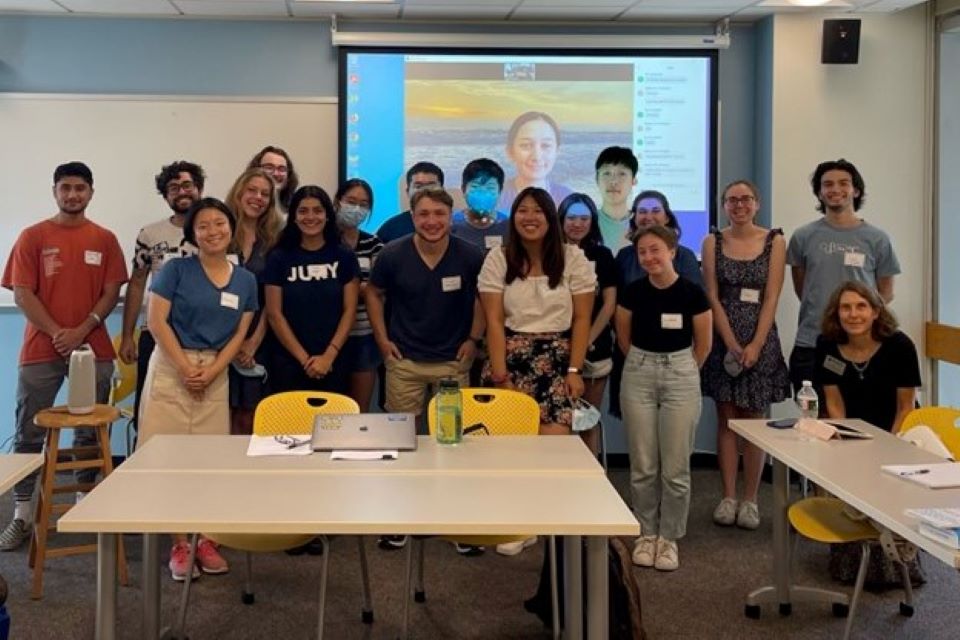
Many of the 2022-2023 Peer Research Mentors
Are you an undergraduate who wants to learn how to get involved in a faculty-mentored research or creative project at Brandeis? Have you recently started or will soon begin work on a research or creative project?
Students interested in research can now contact a URCC Peer Research Mentor for advice!
Peer Research Mentors can advise you on funding applications and preparing a talk or poster for the URCC Symposium.
Interested students can sign up for the URCC Friday mailing to receive timely updates and updates on programming.
Applications for the AY23-24 year program will be available later in 2023.
The URCC thanks Elizabeth Santiago, PhD, the project’s Learning Designer for her role in developing and constructing the course. Development of the URCC Research Training Modules was supported by a grant from the Davis Educational Foundation.
A full-time position as Senior Department Coordinator for the URCC is available. Please contact Margaret Lynch with questions.
Brandeis Events and Opportunities
The 2023 URCC Spring Symposium will take place on Thursday, May 4, 2023 from 12:30 PM - 4:30 PM in the Hassenfeld Conference Center on Brandeis Campus. Undergraduate students are encouraged to present their research or creative project at this one of a kind event. Projects in the creative arts, humanities, social sciences, sciences, and interdisciplinary areas are all welcome.
Over 300 Brandeis faculty, staff, students, alumni and friends attended the 2022 Symposium, which showcased posters, oral presentations, and creative exhibits. The URCC Symposium is a valuable opportunity for students to engage with one another across disciplines and to celebrate one another’s accomplishments as the academic year comes to an end.
Get updates on application details, scheduling, and more by signing up for the URCC Mailing List.
New funding opportunities are being announced each week! Stay updated by subscribing to the weekly URCC Mailing List or checking URCC's Funding Opportunities page.
External Research Opportunities
The URCC has compiled informational lists of undergraduate summer and other research opportunities outside Brandeis. Arts, Humanities, and Social Sciences Research Opportunities and Science Undergraduate Research Opportunities are available!
Thanks to URCC Peer Research Mentors Victoria Liang and Tamar Aizenberg for their work on the listings! Students with questions can contact Margaret Lynch, Director of Undergraduate-Faculty Research Partnerships.
The Council on Undergraduate Research also compiles listings of Internship and Research Opportunities.
Deadline: February 13, 2023
Conference Dates: April 13-14, 2023
The purpose of the Scholarship & Social Justice Undergraduate Research Conference is:
-
to honor scholarship which focuses on challenges facing society with regard to equity and inclusion and historically marginalized and under-represented communities;
-
to illuminate community-engaged research which reflects qualities of reciprocity and mutuality in the co-creation of scholarship, in addition to being transdisciplinary and inclusive of knowledge from outside the academy.
-
to provide undergraduate researchers an opportunity to engage in academic discourse and research dissemination
For student scholars, this is an opportunity to engage in academic dialogue with peers and faculty mentors. For faculty, this conference presents an opportunity to explore new research in equity and social justice across multiple disciplines; and to inspire and be inspired by the next generation of scholars. In particular, we hope that this conference will encourage historically under-represented students to pursue careers in the academy.
Undergraduates are invited to submit proposals to be selected to present their research at the conference as either full presentations or as part of the poster session. All methodological approaches and disciplines are welcomed, including projects that are comparative, international, or transnational. Research proposals that are field-based or use participatory research methodologies are encouraged.
Students may choose to present in one of two presentation categories: Panel Presentations (live) or Poster Presentations (asynchronous).
January 30
MPE Program (University of Pittsburgh)
Program Dates: May 29 - July 28, 2023
Mobilization and Political Economy Summer Research Program (MPE) is a unique research opportunity that will prepare undergraduate students from underrepresented groups to research minority mobilization and political economy and support their placement in graduate programs in the social sciences. This 8-week program will train students in research methods, professional development, mobilization, political economy theories, and mentorship opportunities. The program will be held on-site at the University of Pittsburgh, covering travel, lodging, and living expenses and paying participants a stipend.
January 31
Undergraduate Summer Research Fellowship with IPD (Univ. of Washington)
Program Dates: June 20 - August 18, 2023
$3,000/month stipend to support nine weeks of research at a world-leading research center focused on creating new proteins to solve 21st-century challenges. The IPD is a unique interdisciplinary environment where world-class researchers with expertise in computing and software, biochemistry, genome sciences, biological structure, pharmacology, immunology and other basic science disciplines, as well as clinical medicine, work together to both computationally design and experimentally characterize novel biomolecules. This program expects to support several Undergraduate Summer Research Fellows. Students from underrepresented communities are highly encouraged to apply.
February 3
Trimmer Travel Fund Award: $1,000 to cover travel to a professional meeting between January 1, 2023- December 31, 2023, to share your research.
February 19
Summer Undergraduate Research Program (Univ. of Missouri)
Applications Due: February 19
All programs affiliated with the Office of Undergraduate Research run May 31 – July 28th, with travel days on May 30th and July 29th (9 weeks).
$3,400 - $5,400 stipends for undergraduate students to work with an MU faculty mentor on their own projects in collaboration with graduate students, lab technicians, and post-doctoral researchers. Students live in on-campus air-conditioned housing (double rooms), and receive a meal plan paid by the program. Many programs provide one credit hour of research, travel to and from Columbia, in addition to the stipend payment.
Researcher Spotlights
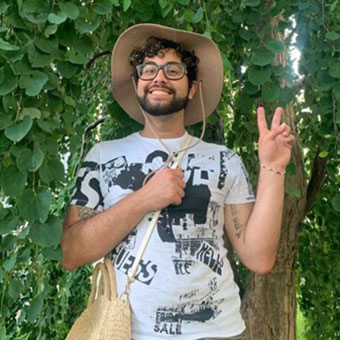 MJ Ibrahim '23
MJ Ibrahim '23
"My research project was based on the experiences of undocumented students in higher education in the US, specifically outlining policy recommendations for post-secondary institutions to implement to make their campuses more “Undocu-Friendly” to support their out-of-status students academically, socially, and financially.
I’m exploring questions on problems undocumented students face during their studies that many people aren’t aware of and ways we can bring awareness and address these unique obstacles."
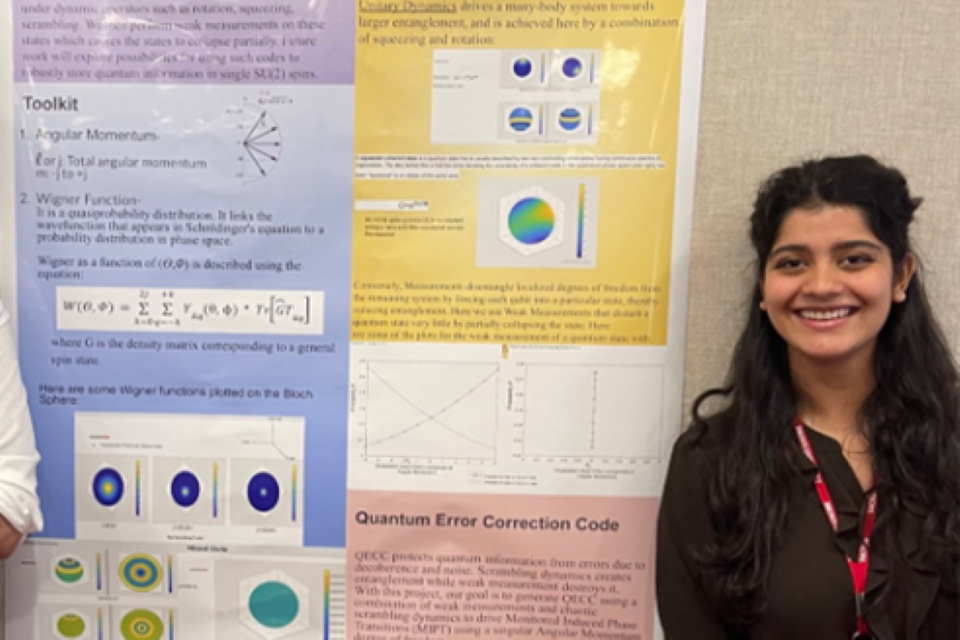 Srishti Nautiyal '23
Srishti Nautiyal '23
"While taking Quantum Mechanics with Professor Brian Swingle in Spring 2021, we learned that unlike space, time is not a measurable quantity but a parameter that is described by a function called as Time Evolution Operator. This Operator is reversible, i.e., theoretically, we can go back in time. I sent an email to Professor Swingle asking about the applicability of this concept in macroscopic systems like reversing milk and tea. Our discussion led to a potential summer research project idea that in fact, came to fruition."
Read on for MJ and Srishti's advice to aspiring undergraduate researchers.
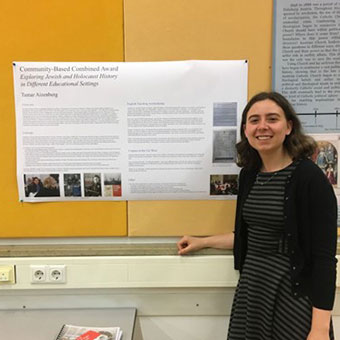 Tamar Aizenberg (PhD, 3rd year)
Tamar Aizenberg (PhD, 3rd year)
"My research focuses on the grandchildren of Holocaust survivors and the grandchildren of Holocaust perpetrators. I study the transmission of the memory of the Holocaust from survivors to their grandchildren and the transmission of the memory of the Third Reich from perpetrators to their grandchildren. I’m also interested in comparing these two forms of transmission to examine if there are any similarities between how each set of grandchildren learns about and processes their family history."
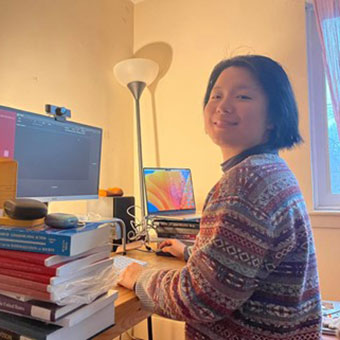 Manning Zhang (PhD, 3rd year)
Manning Zhang (PhD, 3rd year)
"I am currently working on two projects. By doing in-depth interviews and ethnographic observation at a gym, I seek to know more about young people’s motivation to do fitness training, and how their race and ethnicity, gender, socioeconomic status, as well as other sociological characteristics relate to their experience. Inspired by Michael Burawoy’s extended case methods, I try to investigate how fitness can be a case of the intertwined relationship between culture and economy. My other research uses a China national dataset to explore how senior people’s migration may affect their access to health care. This question is in line with my long-lasting concern in people’s hesitation in using primary care service in China, which harms the equilibrium of supply and demand in health care resources."
Read on for Tamar and Manning's advice to aspiring undergraduate researchers.